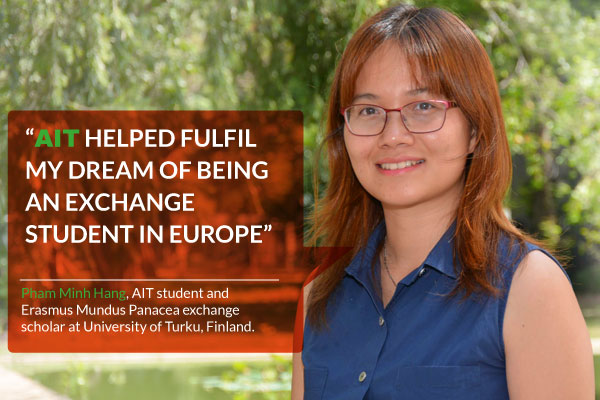
Three AIT students who just concluded their 10-month exchange program in select universities in Europe described AIT as a perfect launching pad for an international and multicultural experience. The three were among those selected from AIT under the Erasmus Mundus Panacea program, which they concluded in June this year.
“AIT prepared us thoroughly for an international experience,” said Pham Minh Hang, a student of Environmental Engineering and Management who attended the University of Turku. “There were hundreds of exchange students in Finland, and while many faced adjustment issues, AIT had already prepared us for an international experience,” Pham said.
This opinion was echoed by Thazin Oo of Food Engineering and Biotechnology, who went to the University of Uppsala. “There were over a 100 Erasmus students at Uppsala, and it was easy for us to interact with an international cohort because of our international experience at AIT,” she added.
Thang San Muang, a Telecommunications student from AIT, who traveled to the University of Bologna recalled: “There were many international students in Bologna, though I was the only one in my program,” he says. Thang, whose thesis at AIT was on the topic of mobile satellite communication over fading channels, had a chance to display his skills when his group work on vehicle-to-vehicle communication was adjudged the best in an idea generating workshop. “It felt good,” commented an obviously happy Thang as he narrated his experience.
An additional facet of the exchange program was exposure to diverse academic fields. While Thazin was working at AIT on the topic of antibiotic resistance of pathogens in prawn and shrimp, at Uppsala University, she had an opportunity to study subjects ranging from gender and sociology to microbial genetics and Swedish. At AIT, Pham’s research was on toxic air pollution caused by traffic in Hanoi, and she studied biology and geology while at Turku University. Similarly, Thang had an opportunity to study innovation and the “Internet of Things” at Bologna University. Thang and Thazin hail from Myanmar, and Pham from Vietnam.
“The degree of independence was also different, obliging students to be responsible for every detail and thus encouraging them to become more self-reliant,” says Thazin. This environment also translated to academic activities, with students expected to work independently. “Beside academics, the entire student body at the university is very active in sports,” says Pham, who was visibly impressed with that aspect of Finland’s culture.
Asked about takeaways from their exchange program, all three students referred to increased confidence, greater adaptability, and better communication skills. “But we would not have achieved this had AIT not prepared us for this international experience,” they add.
About Panacea: PANACEA (EuroPean and Asian Network for ShAring Knowledge on Environment and HeAlth) is an Erasmus Mundus cooperation and mobility program funded by the European Commission supporting students from EU and developing countries. Supported mobility nationals are from Myanmar, Cambodia, Laos, Vietnam, Mongolia, Indonesia, Thailand, China, Sri Lanka, India, Malaysia, the Maldives, the Philippines, and North Korea. Coordinated by the University of Montpellier with AIT as Joint Coordinator, Panacea is a consortium of 10 European and 10 Asian partner universities.



This work is licensed under a Creative Commons Attribution 4.0 International
License.
